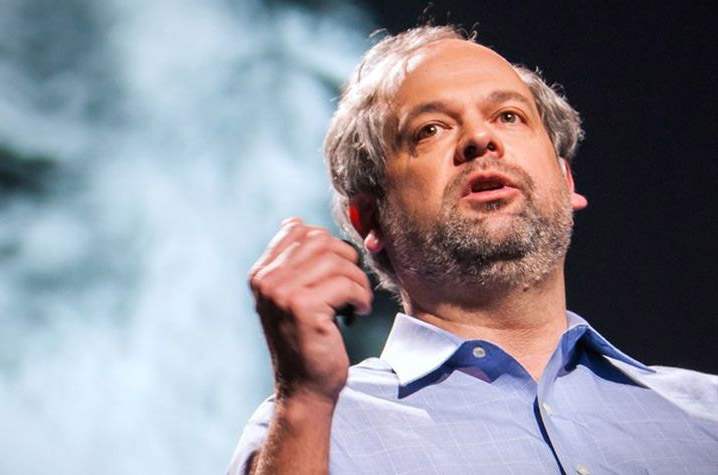Juan Enríquez On The Evolution of Right and Wrong
“What if what’s okay today may be wrong tomorrow?” Juan Enríquez began in virtual Hall on February 4. “What if what’s right flips 180 degrees, and the rules that you’re taught today turn out to be completely wrong tomorrow?” Mr. Enríquez is many impressive things—life science expert, technologist, investor, author—and his most recent book, Right/Wrong, addresses how technology transforms our ethics, and what the implications of that will be in the future. That was the topic he brought to light in Hall as Roxbury Latin’s 2021 Wyner Lecturer.
“Think about this in terms of a time machine,” he said. “You go back to the time of the Mayans. The Mayans practiced human sacrifice, as did the Aztecs, as did a series of other people. Not only was that considered right, it was considered essential to the survival of that civilization, because otherwise the sun wouldn’t rise, or the rains wouldn’t come. Of course, in retrospect, we look at this and we say what a barbaric set of customs.”
Mr. Enríquez went on to talk about how, not that long ago, in France people regularly attended public executions by guillotine as if they were social events—a practice we would view today as horrific. He drew connections to the evolution of ethics and morality in the United States over many centuries, and even over recent decades. He discussed Americans’ view on gay rights, which went from two thirds of Americans being opposed to gay rights in 1997, to two thirds being in favor of it today. He discussed how the abolition of slavery came to be, due in large part to the actions of brave individuals, but also, not coincidentally, along with the advent of machinery and the use of oil as energy, which became an alterative to manpower.
“People used to live, on average, 25 to 35 years,” said Mr. Enríquez. “All of a sudden, across continents, you could treat people better, and life span exploded. You suddenly had a situation where you could produce more and also do the right thing. That is a situation that we may see time and again. As solar energy becomes faster, better, cheaper, we can have more energy and not have to burn coal. We’re going to be judged pretty harshly, as global warming takes hold, by future generations who are going to say: Why didn’t you use solar? Why didn’t you use geothermal? Why were you burning coal? How dare you have done that—that was completely amoral.”
Finally, Mr. Enríquez asserted that the toxic polarization in America today—exacerbated by social media—means we have to reintroduce the words humility and forgiveness into our vocabularies.
“It’s incredibly important to have humility and forgiveness, because we may be wrong. And even if we’re right, the concept of being right and wrong may shift. When we judge the past or each other, when we talk to each other, when we accuse each other, let’s be a little more careful to isolate the 1% of people who are truly evil from the vast majority of people who may have different thoughts or opinions than we do, who were brought up in a different way than we were. We may not agree with them, but they’re trying to, in general, do the right thing. They’re trying to teach their kids what they think is right and wrong. They’re trying to put food on the table. They’re trying to be a good person. The bottom line is this: When you judge the past, do it with a little more kindness and hope your descendants will do the same.”
Mr. Enríquez is the managing director of Excel Venture Management—a life sciences venture capital firm—and the founder of Biotechonomy. He’s also an affiliate of MIT’s Synthetic Neurobiology group; he teaches about the economic and political impacts of life sciences, about future brain technologies, and about the rise and fall of countries. He was a founding director of the Harvard Business School Life Sciences Project, and he also ran Mexico City’s Urban Development Corporation.
Mr. Enríquez has been prolific on TED and TEDx Talk stages around the world, drawing tens of millions of viewers. He is also the author of several bestselling books focused on biological and technological evolution; on political polarization; and on the ethical choices we face, related to these topics, now and in the years ahead.
The Wyner Lecture—established in 1985 by Jerry Wyner, Class of 1943, and his sister, Elizabeth Wyner Mark—is a living memorial to their father, Rudolph Wyner, Class of 1912. We are grateful to continue shedding light on important social issues through the Wyner Lecture.
Watch the entirety of Mr. Enríquez’s presentation, as well as an engaging Q&A session with students and faculty.

